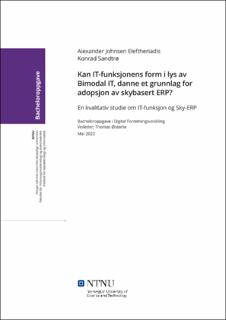Kan IT-funksjonens form i lys av Bimodal IT, danne et grunnlag for adopsjon av skybasert ERP?
Bachelor thesis
Permanent lenke
https://hdl.handle.net/11250/3002860Utgivelsesdato
2022Metadata
Vis full innførselSamlinger
Sammendrag
IT er i konstant endring, og digitalisering utfordrer hvordan IT skal bli organisert i næringslivet. Den tradisjonelle IT avdeling har blitt mer separert fra resten av organisasjonen og har tidligere kun jobbet med drift og support, og intar nå en rolle som et forretningsmessig organ som er kritisk for å sikre seg konkurransefortrinn. Skyteknologi har vært en av katalysatorene for en ny IT-struktur og muligjør en mer iterativ og smidig arbeidsmetodikk. På veien mot å bli mer forretningssentriske, går organisasjoner mot å danne en tosidig IT struktur: en Bimodal IT.
I dag har organisasjoner tre ERP-systemimplementeringsscenarier: on-premise, vertsbasert eller sky. Alle implementeringsscenarioene vil kunne bli påvirket av hvordan IT-funksjonens rolle spiller inn på virksomheten. Skytjenester har blitt en trend de siste årene ved økt elastitet, skalerbarhet og mulighetene for å frigjøre kapital, men kan organisasjoners IT-funksjon ha en påvirkning om hva som velges?
Gjennom kvalitative undersøkelser og analyse skal denne studien belyse problemstillingen: Hvordan påvirker organiseringen av IT-funksjonen beslutning om å gå over til et skybasert-ERP?
Studien resulterte i flere funn som skiller ut to karakteristiske IT-avdelinger med forskjellige oppfattelser og aktiviteter. En av de signifikante funnene viste at IT- funksjoner med mer forretningssentrisk rolle har større sannsynlighet for å adaptere en skyløsning, men at fordelene til sky ikke nødvendigvis veier opp for dagens utfordringer. IT is constantly changing, and digitalisation challenges how IT should be organized in a modern organization. The traditional IT department has become more separated from parts of the organizationby only workingwith maintenanceand support, to a business-centricfunctionthat is critical to securing a competitive advantage. Cloud technology has been one of the catalysts for a new IT structure and enables a more iterative and flexible working methodology. On the road to becoming more business-centric, organizations are moving towards forming a ambidextrous IT structure: a Bimodal IT.
Today, organizations have three ERP system implementation scenarios: on-premise, hosted or cloud. All implementation scenarios may be affected by how the role of the IT function affects the business. Cloud services have become a trend in recent years with increased elasticity, scalability and the ability to free up capital,but can organizations' IT function have an influence on what is chosen?
Through qualitative research and analysis, this study sheds light on the problem: How does the organization of the IT function influence the decision to switch to a cloud-based ERP?
The study resulted in several findings that separate two distinctive IT departments with different perceptions and activities. One of the significant findings showed that IT functions with a more business-centric role are more likely to adapt a cloud solution, but that the benefits of cloud do not necessarily outweigh today's challenges.
